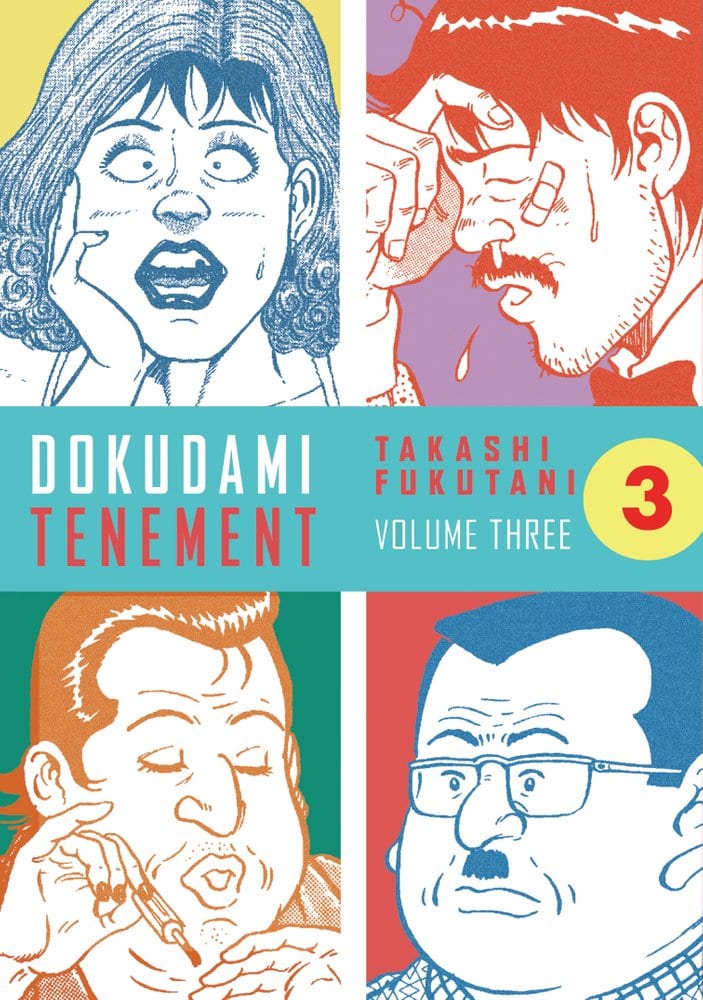As a general rule of thumb, Manga doesn’t concern itself with issues pertaining to working-class or poor people all that often, but one of the notable exceptions to that rule was the late Takashi Fukutani’s long-running Dokudami Tenement, which was serialized to a considerable amount of popular and critical acclaim from the late 1970s to the early 1990s and is now being reprinted in English at a semi-regular clip by Black Hook Press under their YoYo! imprint. The most recent entry in the series, Dokudami Tenement Volume Three: Confessions Of A Transgender (Killing Me Softly) bears a title as long as your arm and contains some scenes that will surely put modern sensibilities about gender identity issues to the test, but is surprisingly ahead of its time in some striking ways, as well.
Like all the Dokudami Tenement stories, this late-1980s entry is purportedly at least semi-autobiographical in nature, its characters and their travails based on actual persons and events either directly experienced by, or relayed by word of mouth, to Fukutani himself, who in turn placed a lot of his own personality into the character of construction worker Yoshio, who stumbles into each scenario and then serves as the eyes and ears of both author and reader alike for the duration. It’s a novel enough approach to the idea of narrative “connecting tissue,” but it’s Yoshio’s fellow tenement residents who are the real “stars” of the series.

This time out, a drunken evening he can’t quite remember drops our guy into the orbit of Franky, an interchangeable office drone who presents as male during the day, but is in the process of transitioning into a female identity as soon as they’re off the clock. A lengthy and often less than fluid “info-dump” introduces Yoshio and, by extension, the rest of us to the particulars of Franky’s situation before we get up to speed with where they are at present, a person whose marriage blew up in scandalous manner now living in substantially reduced circumstances as they come to terms with the process of living as their authentic self. This being the product of a less enlightened age, Franky’s dysphoria is presented most frequently as an unconventional fetish more than anything, which is unfortunate (to put it kindly), and there’s no doubt that the overall tone, as well as a number of the less-than-realistically conveyed sexual scenarios they find themselves (either by choice or otherwise) involved in will (and damn well should) come off as inherently offensive to any number of 21st-century readers be they trans or cis, but to Fukutani’s credit there is a level of sensitivity and understanding in his portrayal of the character that at least occasionally manages to elevate it above the “freak show” finger-pointing that most transgender-themed narratives were mired in at the time.
It’s not enough, however, to propel it beyond the realm of the ultimately exploitative, and playing a lot of Franky’s mannerisms and modes of self-expression for laughs certainly doesn’t help, but the character is at least allowed the dignity of being something other than a simple one-note cipher, and there is an acknowledgement on Fukutani’s part that their struggle for acceptance (both from themselves and others) is not only valid in a more general sense, but also crucial to their emotional and psychological survival. Unfortunately, Fukutani has a persistent habit of trying to pull cheap and easy punch-lines out of Franky’s trials and tribulations, and this consistently pushes the proceedings back down to something just slightly above gutter level --- but there’s an attempt at something more here, even if the narrative can never seem to allow itself to achieve it.

Fukutani’s illustration is certainly expressive and well-considered, his characters by and large looking like real people with a not-unreasonable amount of “cartoony” exaggeration at the margins in order to accentuate their individuality, but in this particular instance this tendency toward slightly over-the-top visuals also serves to undercut and in many cases even de-value the legitimacy Franky’s experiences and even identity, providing an unwelcome counter to some of the poignancy (intentionally arrived at or otherwise) in the script. When hard-earned moments of genuine humanity make their way to the surface of a tonally confused story only to be delineated in a fashion that’s designed to encourage belly-laughs at the expense of a marginalized character, the effect is unsettling at the best of times, infuriating at the worst, and for a series largely known, both at its time and in the years since, for providing a platform for those who live in the socio-economic shadows, there’s especially no excuse for this --- and frankly there wouldn’t be one under any circumstances. Yeah, this book is a product of the attitudes of its era, and it’s slightly more advanced than its contemporaries, but still --- come on. Something’s either respectful or it isn’t, and in too many crucial instances this book clearly isn’t.
An argument could be made, I suppose --- as ones have been for Italian “Mondo” filmmakers Jacopetti and Prosperi and their works such as Africa : Blood And Guts and Goodbye, Uncle Tom --- that Fukutani is working within the strictures of an exploitative framework in order to illuminate the hard and ugly realities of decidedly uncomfortable people, places, and things for a mass audience with populist-bordering-on-low-brow aesthetic sensibilities, and by large that may be true for other volumes in this series focusing on more prosaic concerns, but in the case of Dokudami Tenement Volume Three : Confessions of a Transgender (Killing Me Softly), the years have been less than kind, and not without justification. Sometimes close really only does count in horseshoes and hand grenades.







